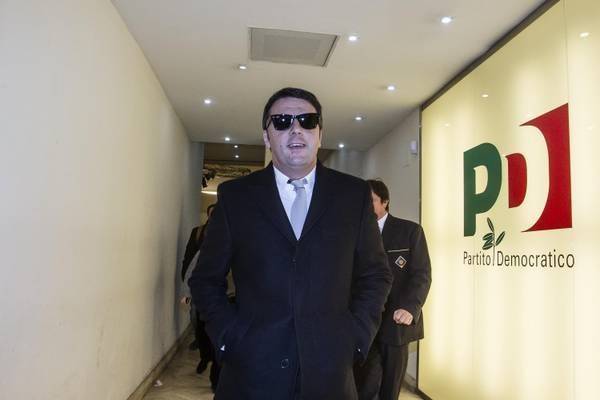Politics Between Zen and the Swamp
"We need a radical project if we are, all together, to drag ourselves out of the swamp," Matteo Renzi told the Partito Democratico (PD) executive today. "We cannot go forward in a situation of uncertainty." That uncertainty may be at an end. Today Premier Enrico Letta, the sober economist who has managed to placate the EU by bolstering Italy's debt position, seemed on the threshold of being obliged to pass the hand to the slightly younger but more charismatic Renzi, former mayor of Florence. "Mine is zen calm," said Letta, "day to day." Following the conclusion of the PD meeting Letta announced that he would resign formally tomorrow.
ROME - As one Italian commentator put it, some government leaders arrive on the scene pre-stamped with sterling silver hallmarks, but with time tarnish into tin. The perhaps overly harsh example given was Mario Monti, who indeed began as a centrist premier with a flourish that faded all too quickly. The positive example cited is Enrico Letta, who arrived as premier with little sparkle, but who is leaving office after only nine months with high marks and a sterling reputation. But leaving he is, and with obvious rancor.
Today the question of silver hallmarks was repositioned as a choice between the politics of zen versus an exit from the swamp. Letta and his fellow Partito Democratico (PD)and rival leader Matteo Renzi have had icy relations for weeks, to the point that they are barely on speaking terms. On Wednesday Letta gave a 40-minute speech laced with sarcasm addressed at Renzi, who has publicly called for Letta to "take a step back," as the currently popular phrasing has it. Letta flatly refused, saying he will not bow out for Renzi, unless his successor's program is made clear--and then Letta presented his own program, which ranged from fighting against corruption to creating jobs for the unemployed. However, he added, he is philosophical: "I'm living day to day with a sense of zen calm," he said.
He needed that: for weeks Letta has come under a barrage of friendly fire and rumors circulated claiming that he is essentially a reborn Christian Democrat. As a result, Letta, the sober economist who managed to bolster the Italian debt position vis a' vis Europe, seemed on the threshold of being obliged to pass the hand to the slightly younger but more charismatic and fast-talking Matteo Renzi, former mayor of Florence. Within his party Letta had come under criticism for having a centrist government which incorporated rightist votes, necessary because of Italy's current three-way political split. As leader of the traditional left, Letta's PD, which includes a hefty contingent of truculent trade unionists, had to choose as governing allies either the right under the leadership of Berlusconi, or the irascibles of Beppe Grillo's Movimento Cinque Stelle (M5S).
On the other hand, among the credits acknowledged to Letta was the elimination from the government of former Premier Silvio Berlusconi's party without the collapse of that very government, no mean feat. The result was that the Berlusconi forces have been splintered into two parties.
Even before the PD secretariat met this afternoon to debate the change--significantly, without the presence of Letta himself--, the media were listing the names of probable ministers for a new, slightly more left-leaning government which, despite the criticism leveled at Letta, is likely to incorporate a party called the New Center-Right.
If Renzi, only last month elected national general secretary of the party, is successful in taking over leadership of this new government, it will be the third since national general elections were held. This is an obvious problem: like Letta's, Renzi's nomination does not reflect a choice by the electorate, and this is surely a weakness. In elbowing his way into office Renzi also runs the risk of burnout, as already happened in the past when Massimo D'Alema shoved Romano Prodi aside and within a year was himself permanently sidelined.
Wearing a black jacket but no tie, in a 30-minute speech Renzi told the PD executive in Rome Thursday that, "There are moments when the leaders of a political party are called upon to give directions for the road ahead. Total transparency is essential. This is one of those times, and we must not lose ourselves in endless discussions, but clarify what proposals we offer the nation." Letta, Renzi added, had headed a "service executive" which had contributed to shoring up a difficult situation, but now a "new executive" was required. In case there were doubts about which new executive he had in mind, Renzi meant his own, which--he promised--would not hesitate to take the necessary risks to bring about reforms immediately. "We need a radical project if we are, all together, to drag ourselves out of the swamp. We cannot go forward in a situation of uncertainty. Yes, I have boundless ambition."
The prestigious Senator Luigi Zanda, also of the PD, warned that the more time lost, the worse the situation risks becoming. "The [Letta] government has done what it could. But now it is time to speed things up with a package of reforms so that we can have a government that will last the entire legislature," said Zanda. Institutional reforms, including of the Senate, are necessary in this "delicate moment" to accompany the measures being taken to improve the economy. "The acceleration Renzi proposes is a necessity. We need first of all a reform of the state itself."






































i-Italy
Facebook
Google+
This work may not be reproduced, in whole or in part, without prior written permission.
Questo lavoro non può essere riprodotto, in tutto o in parte, senza permesso scritto.